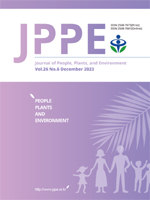Identifying Institutional Demand to Activate Self-Regulation for Climate Change
Identifying Institutional Demand to Activate Self-Regulation for Climate Change
- 인간식물환경학회
- 인간식물환경학회지(JPPE)
- 제26권 제6호
-
2023.12665 - 673 (9 pages)
-
DOI : 10.11628/ksppe.2023.26.6.665
- 2

Background and objective: Self-regulation has recently been implemented as an alternative solution to regulatory problemsbrought on by the inevitable delay of government-led regulations that cannot keep pace with environmental regulatoryrequirements in the field of climate change. The reality is that there has been insufficient preparation regardingimplementing these alternative regulations to ensure that democratic support has been verified, and procedural legitimacyhas been ensured. Methods: This study aims to identify institutional demands measures that can stimulate self-regulation in the future byconducting interviews with people who currently engage in self-regulation in the field of climate and the environment. Results: The analysis is categorized into five groups: G1 for technology development, G2 for management and operation,G3 for facility investment, G4 for corporate support, and G5 for government regulation response. By category, publicinstitutions and research institutes show a high demand for issues related to management and operation. The highlycentralized management and operation sector confirms that there is demand for greater policy enactment in postevaluation,which assesses the achievement of target levels. Conclusion: Since systematic transitions such as climate change are associated with institutional changes in various fieldsalong with technological development, policy coherence and policy integration are seen as vital to the management andoperational aspect of systems established in previous studies.
Introduction
Research Methods
Results and Discussion
Conclusion
References
(0)
(0)